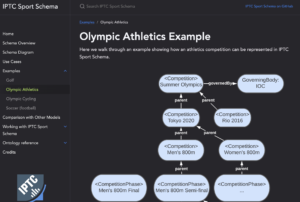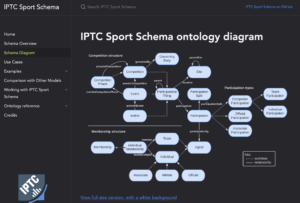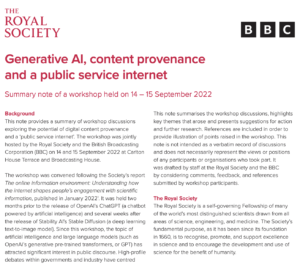Categories
Archives
The IPTC NewsCodes Working Group has approved an addition to the Digital Source Type NewsCodes vocabulary.

The new term, “Composite with Trained Algorithmic Media“, is intended to handle situations where the “synthetic composite” term is not specific enough, for example a composite that is specifically made using an AI engine’s “inpainting” or “outpainting” operations.
The full Digital Source Type vocabulary can be accessed from https://cv.iptc.org/newscodes/digitalsourcetype. It can be downloaded in NewsML-G2 (XML), SKOS (RDF/XML, Turtle or JSON-LD) to be integrated into content management and digital asset management systems.
The new term can be used immediately with any tool or standard that supports IPTC’s Digital Source Type vocabulary, including the C2PA specification, the IPTC Photo Metadata Standard and IPTC Video Metadata Hub.
Information on the new term will soon be added to IPTC’s Guidance on using Digital Source Type in the IPTC Photo Metadata User Guide.

NEW YORK, NY, 26 JULY 2023: The IPTC today announced the beginning of a public feedback and review period of IPTC Sport Schema, which aims to be “the standard for the next generation of sports data.”
The announcement was made by Paul Kelly, Lead of the IPTC Sports Content Working Group, at the Sports Video Group’s Content Management Forum held at 230 Fifth Penthouse, New York.
“The SVG Content Management Forum is attended by senior tech experts from sports broadcasters and sports leagues from the US and around the world, so it is the perfect place to launch the IPTC Sport Schema,” said Kelly. “Many members of SVG have advised us on our work so far, including organisations such as Warner Bros Discovery, NBC Universal, PGA TOUR, Major League Baseball and Riot Games. Presenting our work at their event is a great way to say thanks for their help.”
While not yet an official IPTC standard, the IPTC Sports Content Working Group feels that the schema describing IPTC Sport Schema is solid enough to be published for public feedback.
Sports data for the era of linked data and knowledge graphs
The purpose of the IPTC Sport Schema project is to create a new RDF-based sports data standard, while making the most of the experience the IPTC has gained from the last 20 years of maintaining SportsML, the open XML-based sports data standard used by news and sports organisations around the world.

While XML served the industry well for many years, more recently developers and IPTC members have asked the Sports Content Working Group whether a standard would become available in a more modern serialisation format such as JSON, and whether knowledge graph protocols would be supported.
Because it is based on the W3C-standard RDF and OWL specifications, IPTC Sport Schema leverages the wide range of tools and expertise in the world of knowledge graphs, semantic web and linked open data, including the SPARQL query language, the JSON-LD serialisation into JSON format, inference using RDF Schema and OWL, and more.
“Using IPTC Sport Schema, sports leagues can choose to own their data,” said IPTC Managing Director Brendan Quinn. “Content publishers or sports leagues can publish open data on their website if they choose, in a way that can be re-mixed and re-used by others around the world.” IPTC Sport Schema can also be used for a more traditional model of aggregation and syndication by sports statistics providers who add value to the raw data being collected by sports leagues.
Like its ancestor SportsML, IPTC Sport Schema is created as a generic sports data model that can represent results, statistics, schedules and rosters across many sports. “Plugins” for specific sports extend the generic schema with specific statistics elements for 10 sports such as soccer, motor racing, tennis, rugby and esports. But the generic model can be used to handle any competitive sports competition, either team-based, head-to-head or individual.
As well as IPTC’s SportsML standard, the project is based on previous work by the BBC on its BBC Sport Ontology (some of its creators worked on this project). We have also consulted with and analysed related projects and formats such as OpenTrack and the IOC’s Olympics Data Feed format.
For more information on IPTC Sport Schema, please see the dedicated site sportschema.org, the project’s GitHub repository,
Those who are interested in the details can see an introduction to the IPTC Sport Schema ontology design, the full ontology diagram or full RDF/OWL ontology documentation,
There may be significant changes to the schema between now and when it is released as a fully endorsed IPTC Standard, so we don’t recommend that it is implemented in production systems yet. But we welcome analysis and experimentation with the model, and look forward to seeing feedback from those who would like to implement it in the real world.
People and organisations who are not IPTC members can give feedback by posting to the IPTC SportsML public discussion group or use the IPTC Contact Us form.

In September 2022, IPTC Managing Director Brendan Quinn was invited to attend a workshop at the Royal Society in London, held in conjunction with the BBC. It was convened to discuss concerns about content provenance, threats to society due to misinformation and disinformation, and the idea of a “public-service internet.”
A note summarising the outcomes of the meeting has now been published. The Royal Society says, “This note provides a summary of workshop discussions exploring the potential of digital content provenance and a ‘public service internet’.”
The workshop note gives a summary of key takeaways from the event:
- Digital content provenance is an imperfect and limited – yet still critically important – solution to the challenge of AI-generated misinformation.
- A provenance-establishing system that can account for the international and culturally diverse nature of misinformation is essential for its efficacy.
- Digital content provenance tools present significant technical and ethical challenges, including risks related
to privacy, security and literacy. - Understanding how best to embed ideas such as digital content provenance into counter-misinformation strategies may require revisiting the rules which dictate how information is transmitted over the internet.
- A ‘public service internet’ presents an interesting and new angle through which public service objectives can shape the information environment; however, the end state of such a system requires greater clarity and should include a wide range of voices, including historically excluded groups.
The IPTC is already participating in several projects looking at concrete responses to the problems of misinformation and disinformation in the media, via our work theme on Trust and Credibility in the Media. We are on the Steering Committee of Project Origin, and work closely with C2PA and the Content Authenticity Initiative.
The IPTC looks forward to further work in this area.The IPTC and its members will be happy to contribute to more workshops and studies by the Royal Society and other groups.
Categories
Archives
- February 2026
- January 2026
- December 2025
- November 2025
- October 2025
- September 2025
- August 2025
- July 2025
- June 2025
- May 2025
- April 2025
- March 2025
- February 2025
- January 2025
- December 2024
- November 2024
- October 2024
- September 2024
- August 2024
- July 2024
- June 2024
- May 2024
- April 2024
- March 2024
- February 2024
- December 2023
- November 2023
- October 2023
- September 2023
- August 2023
- July 2023
- June 2023
- May 2023
- March 2023
- February 2023
- January 2023
- December 2022
- November 2022
- October 2022
- September 2022
- August 2022
- July 2022
- June 2022
- May 2022
- April 2022
- March 2022
- February 2022
- January 2022
- December 2021
- November 2021
- October 2021
- September 2021
- August 2021
- July 2021
- June 2021
- May 2021
- April 2021
- February 2021
- December 2020
- November 2020
- October 2020
- September 2020
- August 2020
- July 2020
- June 2020
- May 2020
- April 2020
- March 2020
- February 2020
- December 2019
- November 2019
- October 2019
- September 2019
- July 2019
- June 2019
- May 2019
- April 2019
- February 2019
- November 2018
- October 2018
- September 2018
- August 2018
- July 2018
- June 2018
- May 2018
- April 2018
- March 2018
- January 2018
- November 2017
- October 2017
- September 2017
- August 2017
- June 2017
- May 2017
- April 2017
- December 2016
- November 2016
- October 2016
- September 2016
- August 2016
- July 2016
- June 2016
- May 2016
- April 2016
- February 2016
- January 2016
- December 2015
- November 2015
- October 2015
- September 2015
- June 2015
- April 2015
- March 2015
- February 2015
- November 2014